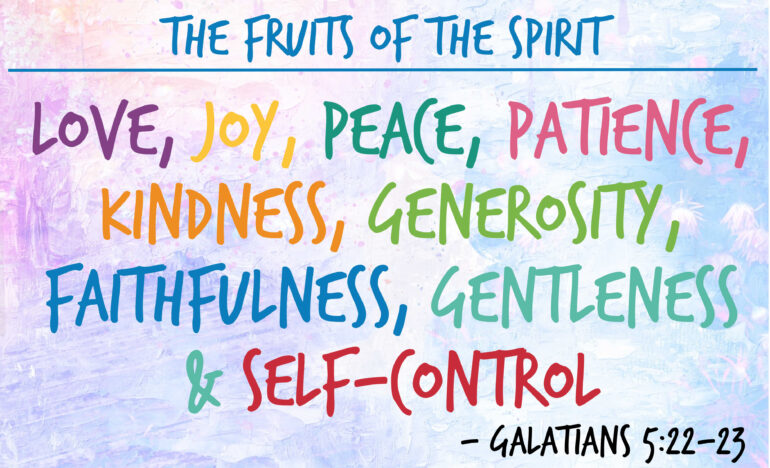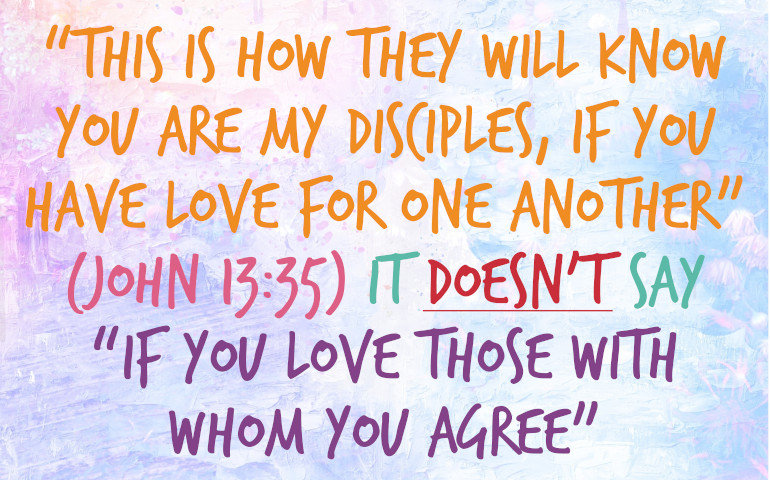Maintaining the Contemplative Life in a Divided World

By Kathy Keary
The other day I was engaged in Lectio Divina, reading the Gospel of John, when the following familiar words struck me in a new and timely way: “This is how they will know you are my disciples, if you have love for one another” (13:35). It doesn’t say “if you love those with whom you agree.” No, these words are inclusive in nature. It struck me as a powerful statement in our divided country and is the impetus for this article.
If someone asked you a decade ago where our country would be in 10 years, would you have imagined the current state of affairs? Division, unrest, and chaos are now sewn into the fabric of our nation by domestic and foreign actors. It’s not uncommon to hear people say that the cherished “land of the free” can be a scary and stressful place.
So a question that may be on your heart is “How do I rise above all the noise that plants seeds of disharmony in my world?” Another way to ask this is “How do I maintain a contemplative life when bombarded by so much?”
Intentionality is key in the spiritual life. Being faithful to the practices that support and enhance your kinship with the divine and promote a sense of unity with all of God’s creation has a paramount impact on your response to the dysfunction that is now plaguing our society. I refer you to the spiritual practices mentioned in this series for ideas on how to foster a way of being in the world that honors God and the divine in all.
New articles in this series are posted to the website every Monday. The full series can be found here: An Invitation to Something New: The Contemplative Life. On Thursday’s we’ll send an email to remind you of the articles.
Read my article “The Five Steps of Lectio Divina.”
Contemplative prayer increases one’s awareness of the indwelling spirit of God in each of us. Allow your words and actions to spring forth from this deep inner space. “Practice the pause” is good advice. When confronted with divisive words, pause before you respond to assure that your words come from this holy place of love.
So much of the hateful rhetoric we see on social media and in the world is the result of people clinging firmly and exclusively to their own ideas. Frequently the concept of “group think” is in play, which says that in order for you to be accepted in this group, you must profess our rigid beliefs.
Contemplative dialogue is a healthy alternative in interacting with others. Recognizing that Wisdom lies within each of us is a first step to understanding an alternate ideology. Place yourself in environments where you are in touch with people with diverse views. Listen respectfully and prayerfully with the intent to grow in understanding.
In pre-Covid days, we held Circles of Understanding at Precious Blood Renewal Center for the purpose of gathering a diverse group of people to share their stories for the purpose of growing in understanding, love, and compassion for one another. We found it to be an effective tool in creating a bond among participants. If forming Circles in your community is intriguing, I refer you to our series, From the Heart: Contemplative Communication.
St. Paul’s letter to the Galatians is instructive as we discern if our current approach is rooted in the contemplative life. He is clear that we are to love and serve one another warning: “If you go on biting and devouring one another, beware that you are not consumed by one another” (5:15). St Paul warns that a life in the Spirit does not include ”hatred,” “rivalry,” “outbursts of fury,” “dissention,” and “factions” (5:20). We are called to live in such a way that the fruits of the Spirit dominate our life: ”love, joy, peace, patience, kindness, generosity, faithfulness, gentleness, and self-control” (5:22, 23).
If you recognize that you have been drawn into the discord that surrounds us, do not be discouraged. Listen to the words of St. Paul to the Corinthians as he describes how the Holy One touched his life: God’s “grace is sufficient for you, for power is made perfect in weakness” (2 Cor 12:9). Do not resist praying for the grace to turn around your behavior and your words.

Don’t get me wrong. Words that advocate for the vulnerable should not be silenced. Living a contemplative life includes stepping out and speaking up for the oppressed and victimized. In doing so, our words may be strong; however, need to always be centered in love. Marianne Williamson, an internationally acclaimed author and lecturer, speaks of the appropriate tone in her book, A Year of Miracles: “If I need to draw a line for the sake of justice, I will do so with an honor for the dignity of all.”
You have the power to be a beacon of peace, unity, and love in your realm of influence. Seize the opportunity to be a uniting force that transforms the harsh narrative that divides the world into camps. Lead by being the voice of our Prince of Peace who summoned all to “love one another” (John 13:34). Allow your words to spring forth from that place within where the Spirit dwells. In doing so, you will be living the contemplative way.
Note: Never miss an article published on the Renewal Center website: Sign up to receive our newsletters
[Kathy Keary, a Precious Blood Companion and spiritual director, holds a master’s degree in theological studies and is a graduate of the Atchison Benedictine’s Sophia Center’s Souljourners Program, an intense study of spirituality and spiritual direction. Kathy believes that the divine is present and active in all of life and encourages others to be awakened to the God in all including the divine within. She enjoys accompanying others on their journey to wholeness discovering the person they were created to be.]
We’d Like to Hear From You!
We’d like to know what you think about our The Contemplative Life Series. Send us a comment using the form below. Do you have a suggestion? Is there something you want to learn more about? Send us a note.
Related

Easter Bread (Pane di Pasqua)
By Lucia Ferrara
Easter bread is a fun bread. It’s a fun bread to make with your children, with your family, with neighbors and friends. The tradition of Easter bread dates back centuries and comes from many parts of the world.

Easter Sunday, the Resurrection of the Lord
Today’s scriptures tell us how three days changed the world. How have they changed you?
Categories
Assembling God's Puzzle Coffee with Padre Cooking & Spirituality Encounters of the 4th Kind Family Matters Reflections on the Eucharsitic Prayers Spiritual Resources Taize Prayers The Contemplative Life Traveling with Pilgrims of Hope Uncategorized Videos Week of Prayer for Uhristian Unity When you need a little help
